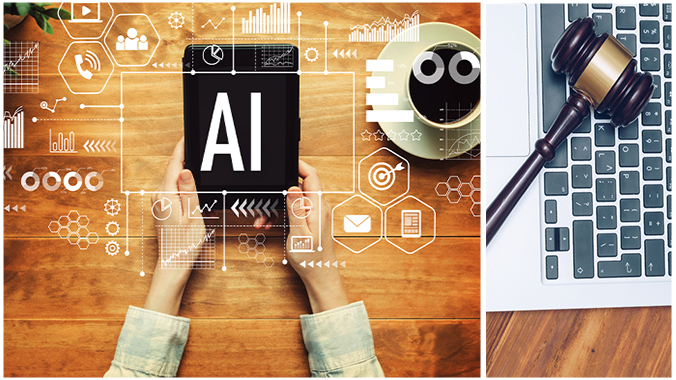The rise of Generative AI (GenAI) technologies has ushered in a new era for the legal profession, offering exciting opportunities to enhance efficiency and effectiveness. However, it also brings forth a myriad of complex ethical and legal challenges. Attorneys need to tread carefully in harnessing the power of AI, ensuring they maintain their ethical standards while reaping the benefits of these cutting-edge tools.
In this blog, we will delve into the legal and ethical implications of AI for attorneys, covering topics such as copyright, right of publicity, confidentiality, and more. We will also explore how the use of AI intersects with the American Bar Association (ABA) Model Rules of Professional Conduct and provide practical guidance for maintaining ethical obligations while navigating the GenAI landscape.
Key Topics:
In this in-depth blog, we will delve into the intricate intersections of AI and the legal profession. We’ll examine the legal and ethical implications of Generative AI (GenAI) across various domains, including copyright, right of publicity, confidentiality, and advertising, all of which have raised significant concerns. Beyond the legal landscape, we’ll explore the ethical considerations attorneys face when incorporating AI into their practices.
GenAI’s Legal and Regulatory Impact
GenAI technologies are creating a seismic shift in the legal and regulatory landscape. Issues related to copyright, right of publicity, confidentiality, advertising, and more have become paramount concerns. Several litigations are already underway, with courts grappling to define the boundaries of AI-generated content and its implications. Additionally, governments and regulatory bodies worldwide are racing to provide guidance and enact new laws to govern the use of AI in various industries.
The challenge for attorneys, as well as the companies they advise, lies in striking a delicate balance between harnessing the benefits of GenAI and managing the inherent risks. Let’s explore some of the key legal areas affected by GenAI and the emerging risk-based approaches companies are adopting.
Copyright and Intellectual Property
GenAI-generated content can raise intricate questions about copyright ownership and infringement. Who owns the content created by an AI system, and can it be protected under intellectual property laws? Courts currently grapple with these issues, and attorneys must prepare to provide guidance to clients on the evolving legal landscape.
- Right of Publicity
AI-generated personas and deepfakes can potentially infringe upon the right of publicity of individuals. Legal remedies must explore to protect the rights of individuals and ensure that AI-generated content does not violate the privacy or identity of others.
- Confidentiality
The use of AI in legal research and document review raises concerns about maintaining client confidentiality. Attorneys must ensure that AI tools are configured to protect sensitive information and maintain the utmost security.
- Advertising and Consumer Protection
GenAI can be used to create marketing materials and advertisements. However, these materials must adhere to existing advertising regulations and not engage in deceptive practices.
Ethical Considerations for Attorneys
As GenAI becomes an integral part of legal practice, it’s crucial for attorneys to approach this transformative technology with caution, ensuring that ethical standards are upheld. This section will examine how the use of AI intersects with the ABA Model Rules of Professional Conduct and offer guidance on compliance.
Rule 1.1 – Competence
Rule 1.1 mandates that lawyers must be competent in relevant technology. In an AI-driven world, this means attorneys must be familiar with AI tools and their capabilities. However, this doesn’t necessitate becoming AI experts. Instead, attorneys should understand the basics and evaluate the suitability of AI for specific tasks.
Rule 5.3 – Supervision
Rule 5.3 requires lawyers to supervise those who report to them. When using AI tools or delegating tasks to AI systems, attorneys must ensure that AI systems are properly supervised, configured, and that the results are scrutinized for accuracy and ethical considerations.
Rule 1.6 – Confidentiality
Rule 1.6 is paramount when working with AI tools that involve sensitive client information. Attorneys must ensure that AI systems are configured to maintain client confidences and that data security is a top priority.
Rule 1.4 – Communication
Rule 1.4 sets standards governing communication with clients. Attorneys using AI must maintain transparent communication with their clients about the use of AI in their legal work. Clients have the right to know how their cases are being handled and the extent to which AI is involved.
Practical Guidance for Ethical Compliance
To maintain ethical standards while leveraging AI, attorneys can follow practical guidance:
- Continual Education: Stay updated on AI developments and understand how AI technologies intersect with the legal profession. Attend relevant training and educational programs to bridge the knowledge gap.
- Supervision and Review: Actively oversee AI systems and review the work they produce. Ensure that the results align with ethical standards and are accurate.
- Data Protection: Invest in robust data security measures to safeguard client confidences and sensitive information.
- Client Transparency: Clearly communicate with clients about the use of AI in their legal matters. Provide information on the tasks AI will handle and how it contributes to the case.
- Due Diligence: Evaluate AI tools and providers, ensuring they align with ethical standards and are suitable for the specific legal tasks at hand.
Conclusion:
The advent of GenAI technologies is transforming the legal profession, presenting both opportunities and challenges. Attorneys must navigate the evolving legal landscape by considering copyright, right of publicity, confidentiality, and other critical issues. Simultaneously, they need to maintain ethical standards as outlined in the ABA Model Rules of Professional Conduct. By staying informed, supervising AI tools, protecting client confidences, and maintaining transparent communication with clients, attorneys can harness the power of AI while upholding their ethical obligations. In this dynamic environment, responsible and informed use of AI can help lawyers deliver more efficient and effective legal services.
Further Reading
Disclaimer: This article is for informational purposes only and does not constitute legal advice. Attorneys should consult with their clients on a case-by-case basis and remain updated on applicable laws and regulations to provide accurate and tailored legal guidance.
FAQs
AI intersects with the ABA Model Rules of Professional Conduct by necessitating that attorneys remain competent in technology, actively supervise AI systems, prioritize client confidentiality, and maintain transparent communication with clients about AI usage. These rules ensure that attorneys adopt AI in the legal profession in alignment with their ethical obligations and responsibilities, ultimately safeguarding client interests and trust.
Transparent communication about AI usage in legal practice is essential to uphold ethical obligations, maintain trust, and empower clients to make informed decisions. It is a best practice that not only benefits clients but also helps attorneys build strong, ethical, and long-lasting client-attorney relationships.
The legal landscape for AI is rapidly changing due to technological advancements and the increasing adoption of AI across various industries. As AI applications expand, regulations and legal interpretations must adapt to address new challenges and opportunities.
The constantly evolving legal landscape for AI reflects the need to adapt to an increasingly AI-driven world. Legal regulations aim to strike a balance between fostering innovation and protecting individuals and society from potential risks associated with AI. As AI continues to evolve and permeate various aspects of our lives, so will the legal frameworks and ethical considerations surrounding it.
Responsible AI use allows attorneys to deliver more efficient and effective legal services. It also ensures that ethical obligations are met, which ultimately protects the interests and trust of clients.





